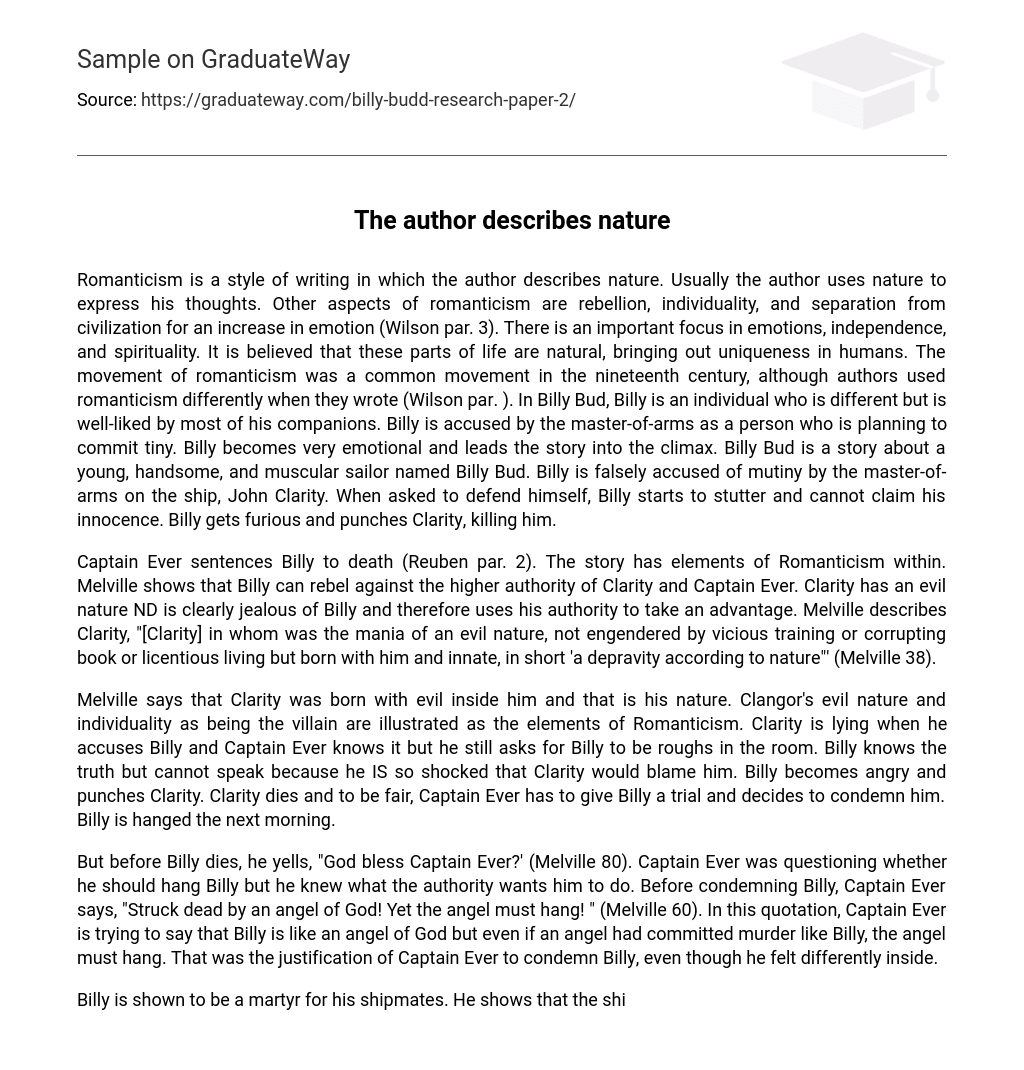Romanticism is a style of writing in which the author describes nature. Usually the author uses nature to express his thoughts. Other aspects of romanticism are rebellion, individuality, and separation from civilization for an increase in emotion (Wilson par. 3). There is an important focus in emotions, independence, and spirituality. It is believed that these parts of life are natural, bringing out uniqueness in humans. The movement of romanticism was a common movement in the nineteenth century, although authors used romanticism differently when they wrote (Wilson par. ). In Billy Bud, Billy is an individual who is different but is well-liked by most of his companions. Billy is accused by the master-of-arms as a person who is planning to commit tiny. Billy becomes very emotional and leads the story into the climax. Billy Bud is a story about a young, handsome, and muscular sailor named Billy Bud. Billy is falsely accused of mutiny by the master-of-arms on the ship, John Clarity. When asked to defend himself, Billy starts to stutter and cannot claim his innocence. Billy gets furious and punches Clarity, killing him.
Captain Ever sentences Billy to death (Reuben par. 2). The story has elements of Romanticism within. Melville shows that Billy can rebel against the higher authority of Clarity and Captain Ever. Clarity has an evil nature ND is clearly jealous of Billy and therefore uses his authority to take an advantage. Melville describes Clarity, “[Clarity] in whom was the mania of an evil nature, not engendered by vicious training or corrupting book or licentious living but born with him and innate, in short ‘a depravity according to nature”‘ (Melville 38).
Melville says that Clarity was born with evil inside him and that is his nature. Clangor’s evil nature and individuality as being the villain are illustrated as the elements of Romanticism. Clarity is lying when he accuses Billy and Captain Ever knows it but he still asks for Billy to be roughs in the room. Billy knows the truth but cannot speak because he IS so shocked that Clarity would blame him. Billy becomes angry and punches Clarity. Clarity dies and to be fair, Captain Ever has to give Billy a trial and decides to condemn him. Billy is hanged the next morning.
But before Billy dies, he yells, “God bless Captain Ever?’ (Melville 80). Captain Ever was questioning whether he should hang Billy but he knew what the authority wants him to do. Before condemning Billy, Captain Ever says, “Struck dead by an angel of God! Yet the angel must hang! ” (Melville 60). In this quotation, Captain Ever is trying to say that Billy is like an angel of God but even if an angel had committed murder like Billy, the angel must hang. That was the justification of Captain Ever to condemn Billy, even though he felt differently inside.
Billy is shown to be a martyr for his shipmates. He shows that the shipmates should stand up for what they believe in. Billy feels that the whippings that Clarity used to give were bad and tried to avoid them. Billy offends Clarity and dies at the end. This book portrays the rebellion against authority, which is an element Of Romanticism. Other elements in this scene include the individuality of Billy and aspects of life that are natural, which brings out the uniqueness of Billy. When Billy is asked to defend himself, he is speechless.
Billy starts to stutter, which is a natural defect that he has. The stuttering issue makes Billy unique and an individual. If Melville had not given Billy the stuttering problem, Billy might have not killed Clarity. The plot of the story could be affected by just one detail. This is how Melville uses Romanticism in Billy Bud. Billy Bud was also analyzed, criticized, and enjoyed by other people, such as Albert Campus. Campus believed that the Tory was a “flawless story that can be ranked with certain Greek tragedies” (Campus par. 2).
Campus also says that Captain Ever gives his heart to the law by condemning Billy. Ever could have let Billy live but he wanted to be fair and do what the authority would want him to. Ever follows nature by doing what everyone would expect him to do which portrays an element of Romanticism. Captain Ever also represents authority as in the highest official aboard the ship. Campus is correct when he compares Billy Bud to Greek tragedies because the story has a plot which creates emotion during many moments eke Greek stories which is why it is an element of Romanticism.
Roger Shattuck says that Captain Ever, Clarity, and Billy are of one individual broken into three parts, “Captain Ever standing for the pride of both reason and authority, Clarity, who represents ‘depravity according to nature,’ and Billy, who embodies ingenuous goodness” (Shattuck 82). Shattuck shows that all three of these characters stand for something and rebel. Ever rebels against pride and therefore condemns Billy, Clarity rebels against morals and therefore is unmoral as seen when he whips other sailors. Billy rebels against the authority fever and Clarity when he does not speak and punches Clarity, killing him.
All three of these characters embody elements of Romanticism. Also, Clarity and Billy represent the Devil and Adam. V. H. Aden writes that Clarity is like the Devil because he tempts Billy, who is like Adam. For Clarity to punish Billy for the sins of the rest of the ship, Billy must know what sin is. So Billy sees the whipping that Clarity gives to other sailors (Aden 86). In the end, Billy is an individual who dies because of the nature of society, of his uniqueness and defects, and his separation from civilization. Billy is separate than his civilization because he is the only civil one.





